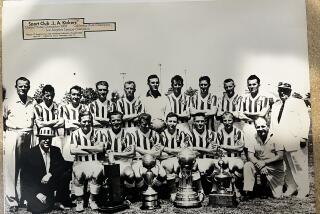After becoming one of Germany’s hottest young forwards, he’ll be playing with the U.S. team in Copa América

Reporting from Berlin — Bobby Wood was a shy 14-year-old from Southern California when he came to Germany with big dreams. It didn’t take long for that to turn into a nightmare, though, because Wood didn’t speak a word of German, couldn’t fathom how cold and dark the country and the people could be, and didn’t get any respect as an American coming from a nation with such little soccer history.
Fast-forward nine years and Wood, now fluent in German, has emerged as one of the country’s hottest young forwards after scoring 17 goals for second-tier Union Berlin — most-ever by an American in Germany’s top two divisions — and earning a promotion to the top-tier Bundesliga.
That’s a success Wood hopes to build on this month when he figures to be a focal point of the U.S. attack in the Copa América Centenario, the 100th-anniversary edition of the world’s oldest soccer tournament and the most important men’s event to be played in the U.S. since the 1994 World Cup.
The U.S. will get the 16-team, 10-city competition started Friday when it kicks off against Colombia at Levi’s Stadium in Santa Clara. And for Wood, the timing couldn’t be better.
“I’ve grown as a player over the years and I’m a lot more confident now,” he said before leaving Germany last month to join the U.S. team ahead of tuneup matches with Puerto Rico, Ecuador and Bolivia. Wood started two of the three games, scoring once and assisting on the winning goal in another.
“I’m not as shy or scared on the field as I was a few years ago,” he continued. “I’m a totally different player. I’ve worked hard to get where I am. I guess I’m being rewarded for all that hard work.”
Wood is getting used to starting over as well. Born in Honolulu, he moved to California when he was 12 and played youth soccer for the Irvine Strikers. The move to Germany was much tougher. After joining a youth academy in Munich, where he lived with a host family, he was ostracized by teammates and faced cutthroat competition just to get on the field.
The difficulty in adapting nearly killed his career before it had even begun.
“It was tough being away from home and the mentality is so different. It’s a lot meaner, not as open, not as laid-back and as friendly in California,” he said. “You just have to go through it. I just learned to deal with it. I think the experience definitely made me stronger.”
Even if it took a while for that to show. In his first six Bundesliga II seasons with 1860 Munich and Erzgebirge Aue, Wood scored only six times in 63 games and at the age of 22, he appeared to be running out of time for his dream.
U.S. Coach Juergen Klinsmann, who also began his playing career in the German second division, picked up on Wood’s discomfort and pushed him to take charge of his career and make things happen — a debt Wood repaid last year by scoring game-winning goals for the U.S. against the Netherlands and Germany and a tying goal against Mexico in overtime.
“He’s very driven and able to go through a lot of pain,” Klinsmann said. “He’s a good listener. He went the tough route, leaving home very early, but he never lost sight of his goals.”
Wood’s success continued when he returned to Germany, where he scored in seven consecutive games for Union Berlin. That performance paid off for both the club and the player two weeks ago when Union Berlin, which had paid a transfer fee of $880,000 to acquire Wood from 1860 Munich a year ago, sold him to Hamburg SV for $4.4 million. For Wood the transfer came with a four-year contract and a spot in the Bundesliga.
His goal had been realized. Now, at 23, he has a chance to produce on an even bigger stage. With two-time World Cup starter Jozy Altidore out of the Copa America with a hamstring injury, Wood will be counted on to share much of the U.S. team’s offensive load with veteran Clint Dempsey and Galaxy forward Gyasi Zardes.
And while that brings with it a new set of challenges, it also erases a big one in that Wood no longer has to prove that he belongs.
“I don’t think it’s gotten harder,” he said after Tuesday’s training session in San Jose. “I think I’ve gotten more respect from the people around me. I feel more integrated in the team.
“So I feel more comfortable, [my] confidence growing. It’s a lot more fun to play.”
But with a spot in the German first division in his hands and national team stardom at his fingertips, don’t expect Wood to stop pushing himself now. This, he’s convinced, is the start of his journey, not the end.
“I don’t want to get too comfortable in any one place,” he said. “I developed as a player at Union Berlin because I had the opportunity to play every week. I knew I had the potential to make it and become a strong player. I’m still hungry and always want to make the next big step.”
Kirschbaum, a special correspondent, reported from Berlin. Baxter reported from San Jose, Calif.
Twitter: @kbaxter11








